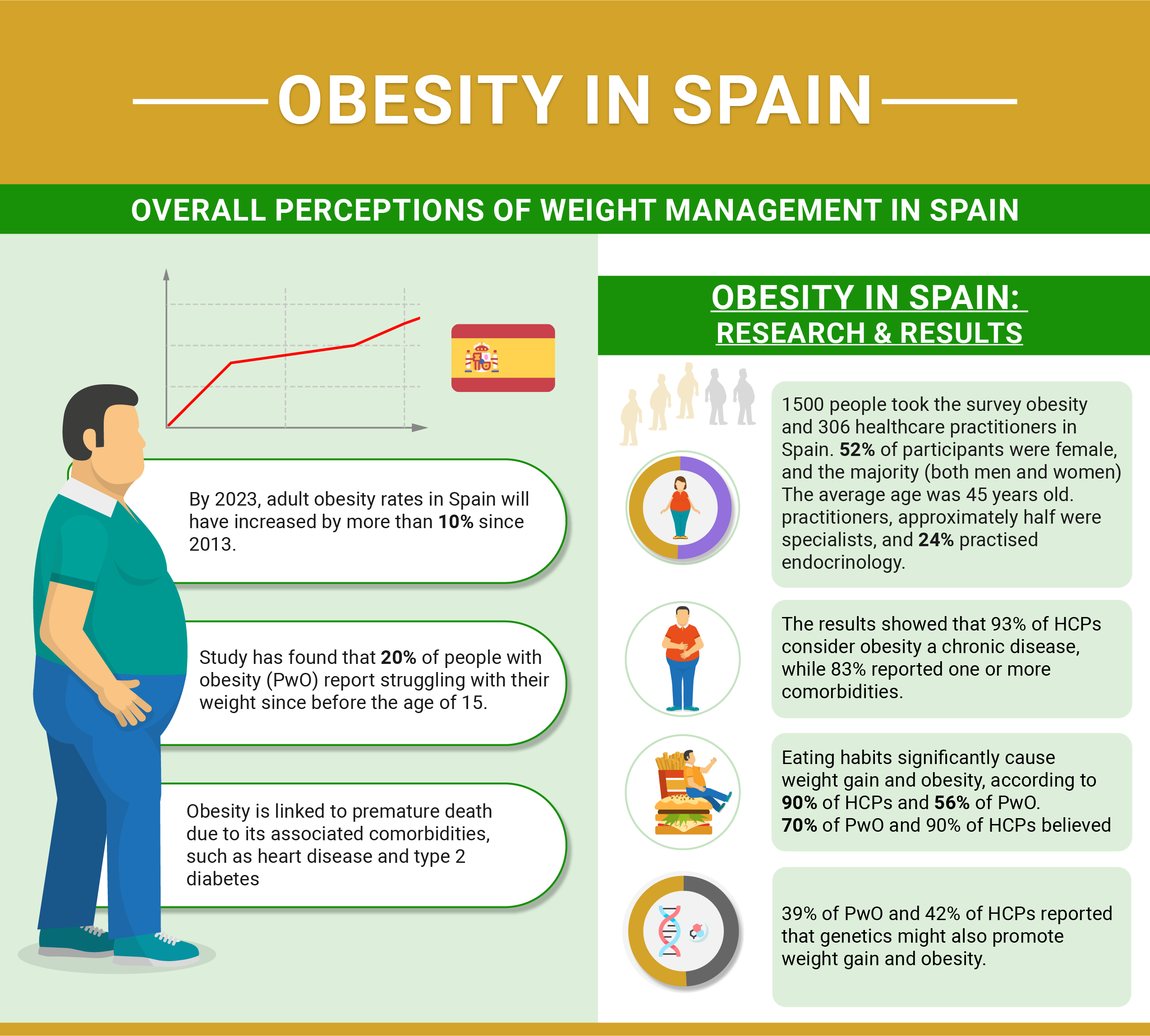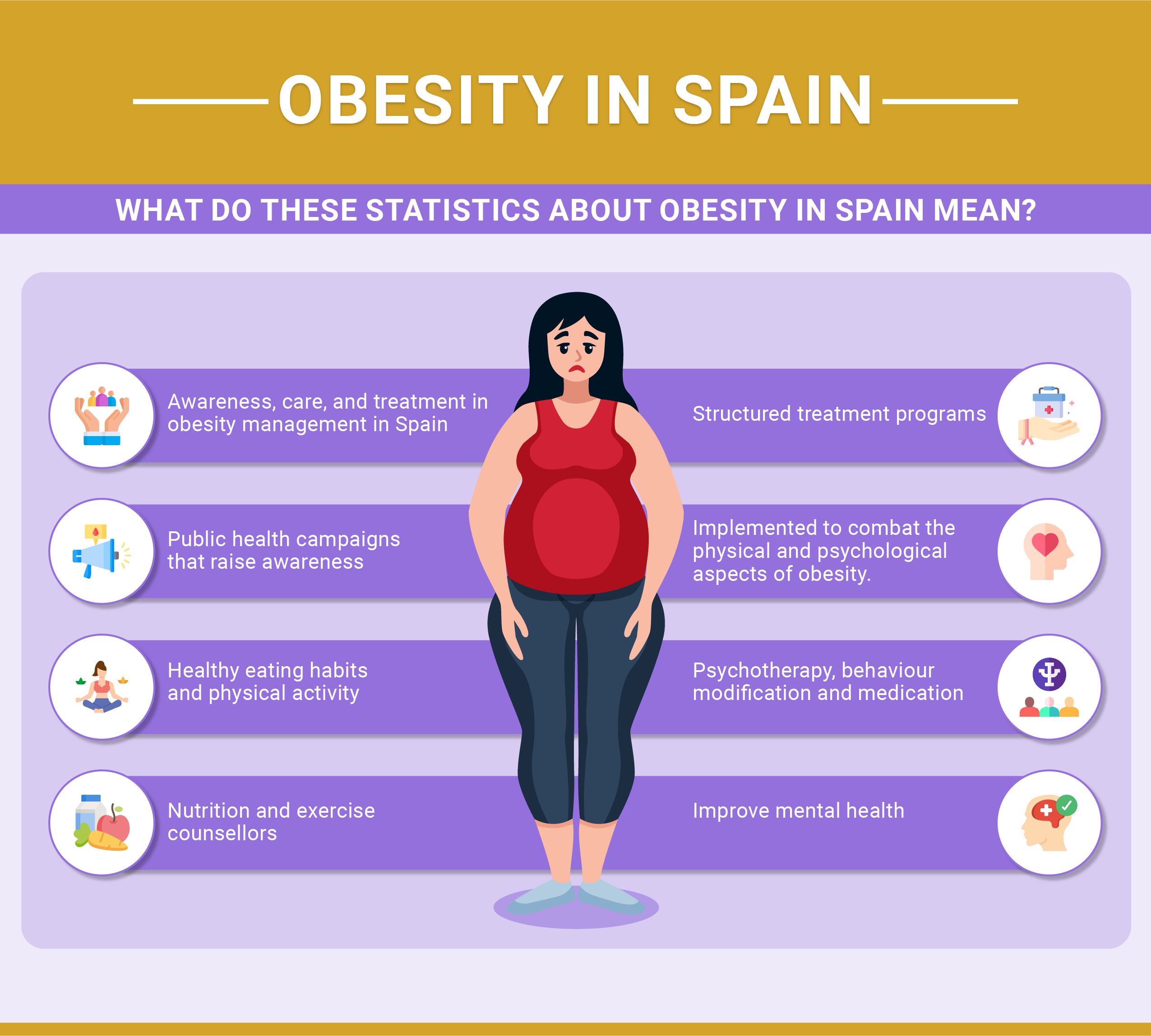Obesity is a growing concern worldwide but is becoming a significant concern in Spain. Recent projections have predicted that by 2023, adult obesity rates in Spain will have increased by more than 10% since 2013. This alarming increase has caused researchers to take a closer look into the causes and effects of this issue and potential solutions. To better understand the perceptions, attitudes, and behaviours of people with obesity (PwO) and health care practitioners regarding weight management in Spain, the Awareness, Care, and Treatment in Obesity Management (ACTION) conducted a cross-sectional survey.

Spain's obesity problem is a growing epidemic, quickly becoming one of the biggest public health challenges in the country. This study has found that 20% of people with obesity (PwO) report struggling with their weight since before the age of 15. Obesity is linked to premature death due to its associated comorbidities, such as heart disease and type 2 diabetes, which can lead to severe consequences for individuals' physical and mental well-being. Not only does this reduce the quality of life, but it also puts a tremendous strain on healthcare systems financially and through increased demand for medical services.
Consequently, there is an urgent need for reliable means of prevention and treatment to reduce the burden of obesity in Spain. We must understand more about the causes and effects of obesity to develop effective health policies to help combat this rising epidemic. This article will explore the factors contributing to the rapid rise of obesity in Spain and its main implications for public health. It will provide an overview of the survey results from ACTION on PwO and healthcare practitioners related to weight management and discuss potential strategies for combating this epidemic.
The rising prevalence of obesity in Spain is a pressing public health concern due to its associated long-term consequences, such as an increased risk for cardiovascular disease, diabetes mellitus, and certain cancers. It has also been suggested that obesity may contribute to mental health struggles such as depression and anxiety due to social stigma and discrimination faced by individuals who suffer from it. These struggles alone are associated with declines in mental health and quality of life, increases in unhealthy eating habits, and avoidance of physical activity.
The ACTION studies conducted in Spain aimed to understand better the perceptions, attitudes, behaviours, and potential barriers to obesity management of both people with obesity (PwO) and healthcare professionals (HCPs). The non-interventional, descriptive research adopted a cross-sectional design and collected data via an online survey. 1500 people took the survey obesity and 306 healthcare practitioners in Spain. 52% of participants were female, and the majority (both men and women) were in the class I obesity category. The average age was 45 years old. As for the healthcare practitioners, approximately half were specialists, and 24% practised endocrinology.
The results showed that 93% of HCPs consider obesity a chronic disease, while 83% reported one or more comorbidities. This highlights how severe and widespread the issue is in Spain. Moreover, it shows that both groups agree that obesity significantly impacts health, which should not be underestimated. As such, taking steps towards prevention and management is crucial, including healthy eating and physical activity. This is especially true for HCPs, who must be willing to discuss weight management openly with their patients.
The study's results also suggested that unhealthy eating habits significantly cause weight gain and obesity, according to 90% of HCPs and 56% of PwO. Similarly, 70% of PwO and 90% of HCPs believed that low activity levels contribute to this condition. Additionally, 39% of PwO and 42% of HCPs reported that genetics might promote weight gain and obesity. Moreover, of the individuals who reported having attempted to lose weight multiple times, only 13% could sustain their weight loss of 5% or more for at least one year. This suggests that despite the wide range of strategies being used by PwO in Spain, only some successfully achieve long-term and sustained weight loss.
This research has highlighted the need for more effective strategies to prevent and manage obesity in Spain to reduce its burden on society. For these reasons, policymakers have called for a collaborative approach that includes public and private organisations, healthcare practitioners, and individuals to develop effective health policies to help combat this rising epidemic.

The results of the ACTION survey demonstrate a need for greater awareness, care, and treatment in obesity management in Spain. The most efficient way to combat this epidemic is through preventative measures. This can include public health campaigns that raise awareness of the importance of healthy eating habits and physical activity and provide access to nutrition and exercise counsellors. In addition, structured treatment programs should be implemented to combat the physical and psychological aspects of obesity. These could include psychotherapy, behaviour modification therapy and medication if necessary.
Moreover, those suffering from obesity in Spain should be encouraged to seek professional help and advice from their healthcare provider regarding the best strategies for managing their condition. Finally, research should continue to explore ways in which people with obesity can overcome the stigma associated with it to improve mental health outcomes and quality of life.
At Weight Loss Coach, we are committed to helping individuals reach their targeted weight goals safely and effectively. We have years of proven experience, and our extensive knowledge of nutrition and psychology has enabled us to develop a unique program that caters to various individual needs. Our team of weight loss doctors creates customised plans based on specific body types and lifestyles, working towards helping clients achieve their dream physique in the most sustainable way possible.

Comments